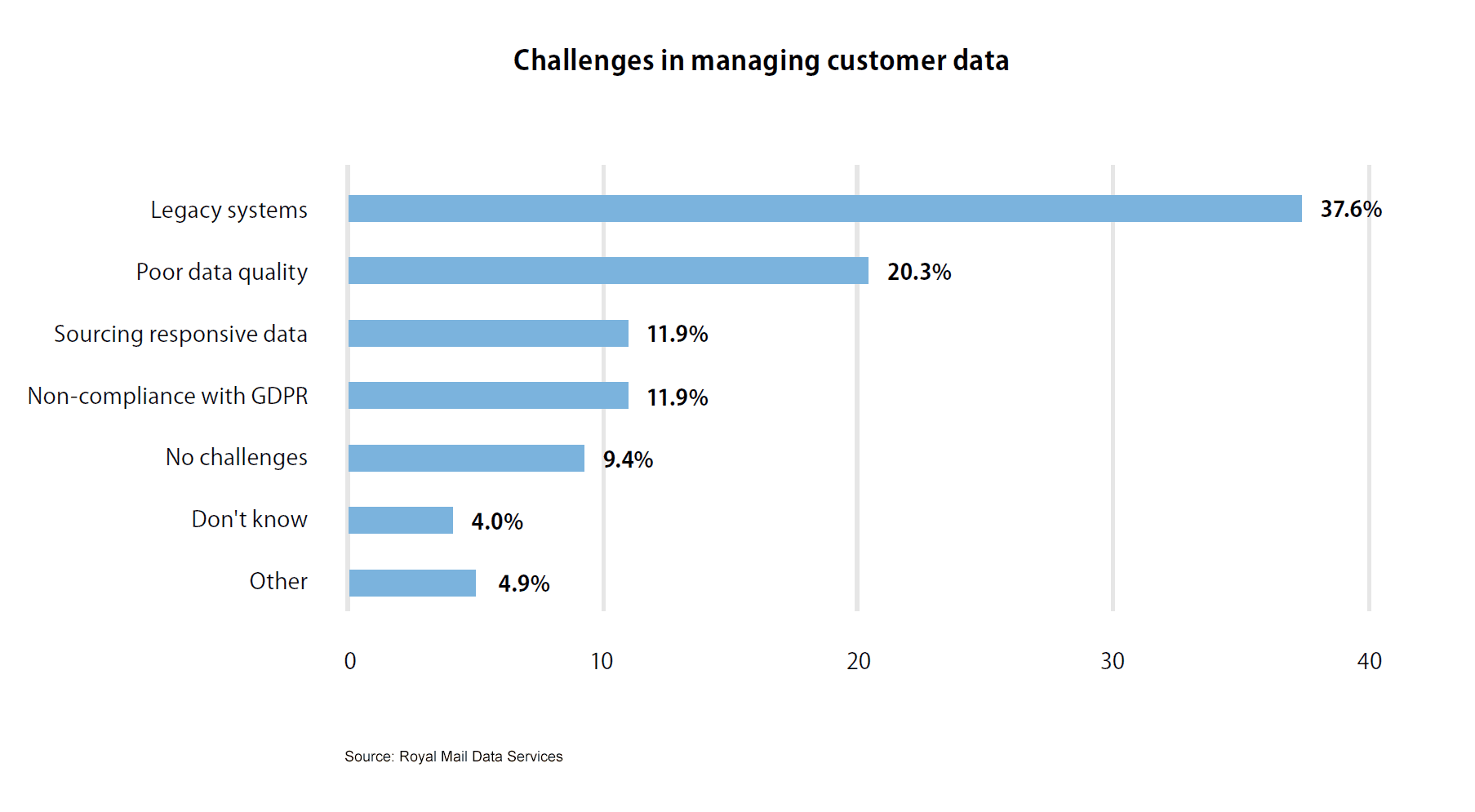The Managing Director of Royal Mail's Data Services shares his insights into the true cost of poor-quality customer data.
As more marketers work to improve ROI and address new data regulations, the true costs of poor-quality customer data are about to become clear
New research into the use and management of customer data from Royal Mail Data Services reveals that UK organisations estimate poor-quality customer data is costing them an average of 6% of their annual revenues. So how can marketers and data experts finally clean up their customer data to improve overall operational efficiency and campaign effectiveness and comply with data protection regulations?
Marketers face a data dilemma
Today’s marketers rely on good-quality contact data above all else to ensure the success of a campaign’s performance. Yet despite reporting data quality as having the biggest impact on campaign response and conversion rates, nearly all marketers surveyed (91.4 per cent) say their organisations are still plagued with data-quality issues. The myth that resolving data quality is a one-time fix is partially to blame.
It is no surprise that working with inaccurate or out-of-date customer contact data, UK brands lose one in five customers each year on average, a trend that has been on the rise since 2014. More than half of marketers (52%) say their biggest struggle is to acquire the new customers necessary to fill that “leaky bucket”.
The European Union’s General Data Protection Regulation (GDPR) came into effect last year, and businesses must comply with its re-permissioning requirements by May 2018. Nearly three in five marketers (58%) surveyed have concerns over the compliance of their in-house customer data, and a similar number are shying away from using third-party data because they don’t trust that it will comply with the EU’s new, tougher data-permissioning standards.
Addressing poor-quality customer contact data
With such a dim view of the state of their data, it’s clear that in 2017 marketers must make big changes to improve campaign success through better data management.
Untangling this web starts with recognising the proliferation of sources that capture a variety of customer data, which needs to be permissioned, validated, cleansed and managed. Digital marketing continues to lead in data capture, with websites (86.9%) and mobile web (48.5%) offering daily influxes of new customer information. Transactional data collection is also on the rise. Two-thirds of marketers (64.6 per cent) capture data from direct sales, up from just over half (55%) last year. Both sources provide data that either comes with first-party consent (direct sales) or can be leveraged to gain it (from websites). Direct customer contact continues to be an important data source for nearly half of companies, via either face-to-face (48.5%) or contact centres (45%).
With such a range of active data sources, responsibility for data management is often shared across multiple functions without consistent data collection processes. While marketing leads in setting data strategy and collection for most companies (53.5% and 49.5%, respectively), CRM functions, customer service, sales and e-commerce often collect customer data as well. For some organisations, centralised data management operations or IT take on this role (27.7% and 22.8%, respectively).
As businesses prepare for stricter compliance and re-permissioning rules, every function that collects customer data must also work with their legal and compliance teams, who manage data privacy and permissions in nearly half of surveyed organisations (44.6%). With so many channels capturing customer data, organisations are crying out for a single definition of what data to collect and validate, as well as the back-end data integration tools to ensure quality and compliance.
The complexity of internal data management structures seems to be compounding the problem. In the three years since Royal Mail Data Services first conducted this research, we have seen a steady rise in the number of marketers reporting problems with incomplete, out-of-date or duplicate data. However, today 65 per cent of organisations cleanse their customer data just once a year, have no processes in place at all, or simply don’t know how often their data is cleansed.
GDPR guidelines could mean that unless organisations act now to improve the quality of their customer data, they will face a shortfall in usable, permissioned customer information in less than two years.
Finding a path forward
Efforts to improve the quality of customer contact data must start at the top. Marketing and data teams need to work alongside their legal and IT colleagues to present clear business cases to tackle the data-quality problem. Looming regulatory deadlines give marketers a mandate to educate leaders on their organisations’ current data challenges and make the necessary investments to overcome long-standing customer data management challenges, in order to improve marketing performance, drive business growth and comply with the GDPR.
With more than seven in 10 organisations starting their data-quality journeys with incomplete, inaccurate or out-of-date customer data, marketers will find support from working with a trusted partner to first validate their existing customer data, and then create a universal process for automatically validating all incoming data at the point of capture. Once existing data is validated, businesses need to create formal, continuous data-cleansing and enhancement processes to keep customer information accurate, permissioned and compliant over the long term. Using compliant and permissioned third-party customer contact data will allow marketers to ensure contact data is up to date as customer information changes. Finally, they must work now to put re-permissioning strategies in place to ensure GDPR compliance ahead of the May 2018 deadline.
Making sense of historic, persistent data-quality problems can seem overwhelming, but with professional guidance and consistent commitment across the business, 2017 can be the year organisations overcome the issues of poor-quality customer contact data once and for all.
To learn more, download Royal Mail Data Services’ full research findings here.
from Smart Insights http://ift.tt/2mA79di
via IFTTT

0 comments:
Post a Comment